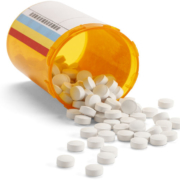13 December 2019
For women at high risk for breast cancer, tamoxifen and raloxifene have both been shown to be effective in reducing risk by approximately 30-40%. A recent small study found that low dose (5mg) of tamoxifen is also effective for risk reduction.
In post-menopausal women with a history of breast cancer, it is known that anastrozole (Arimidex), an aromatase inhibitor, is more effective than tamoxifen in terms of reducing breast cancer recurrence. Anastrozole can also be used in high risk women to decrease the likelihood of breast cancer developing, but there is not as much data as we have for tamoxifen.
Updated results of the International Breast Cancer Intervention Study II (IBIS II)* were presented at the San Antonio Breast Cancer Symposium and published in The Lancet. This study compared 5 years of anastrozole versus placebo in post-menopausal women who were at elevated risk for breast cancer. 3864 women were included. After median follow up of 10.9 years, there were 85 breast cancer cases in the anastrozole group versus 165 in the placebo group, a 49% reduction. The “number (of patients) needed to treat” to prevent one breast cancer is 29. There were no differences in deaths. Interestingly, there was also a significant decrease in non-breast cancers in the anastrozole group (147 vs 200), primarily non-melanoma skin cancers. There was no increase in fractures or cardiovascular disease in patients taking anastrozole compared with placebo.

This study shows that as is the case for treatment of breast cancer in post-menopausal women, anastrozole is more effective than tamoxifen for risk reduction. However, side effects of anastrozole are well known (most commonly hot flashes, vaginal dryness, bone / joint pains, and osteoporosis), and may prevent some women from starting or completing a 5-year course of risk-reducing treatment. Women who are at high risk for breast cancer should also be aware of the increased screening (MRI in addition to mammogram) that is often recommended, and all women should understand the influence of lifestyle factors on breast cancer risk, including regular exercise, moderation in alcohol intake, following a healthy diet, and maintenance of an ideal body weight.
ASCO Post: Dr. Jack Cuzick IBIS II 10-year results
*If you are not able to access the full study and would like a copy, please email me: contact at drattai dot com




